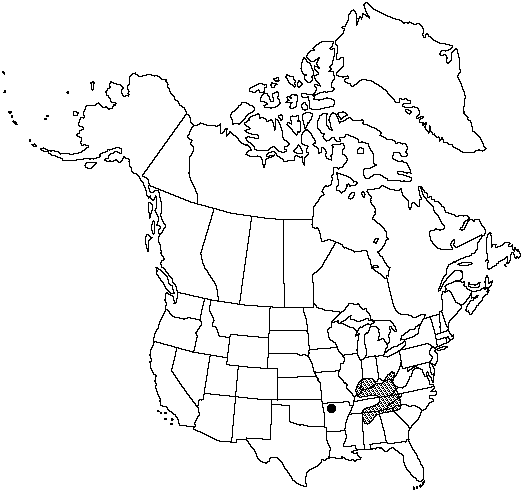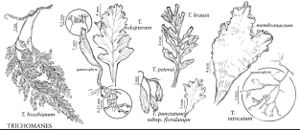Trichomanes boschianum
Ned. Kruidk. Arch. 5(2): 160. 1861.
Plants on rock. Stems long-creeping, slender, bearing widely spaced leaves; stems covered with dark multicellular hairs of 2 kinds, unbranched gland-tipped hairs and branched or unbranched rhizoidlike hairs, sparsely rooted. Leaves lanceolate, 1–2-pinnate-pinnatifid, 4–20 × 1–4 cm, bearing scattered short, unbranched, glandular-hairs on principal veins; petioles shorter than blades. Venation pinnate, without unconnected false veins. Soral involucres terminal on lateral-veins at base of lobes, conic, not flaring at mouth; involucral lips not dark-edged. Gametophytes composed entirely of branching filaments. Gemmae composed of short filaments of undifferentiated cells. 2n = 72, 108, 144.
Habitat: In deeply sheltered grottoes on noncalcareous rocks
Elevation: 150–800 m
Distribution

Ala., Ark., Ga., Ill., Ind., Ky., N.C., Ohio, S.C., Tenn., Va., W.Va., Mexico in Chihuahua
Discussion
Although earlier treated as synonymous with the tropical American Trichomanes radicans Swartz, recent authors have agreed that Trichomanes boschianum is a distinct taxon endemic to eastern North America. It exists as fertile diploids and tetraploids with occasional sterile triploids. Diploid cytotypes are prevalent in western localities, and polyploids are more common to the east. Although occurring in climatically moderated habitats, most populations suffer heavy mortality from sporadic droughts. The plants are very slow to regrow, and many populations are currently but a fraction of their size of 20 years ago. They seldom show evidence of sexual reproduction although gametophyte colonies of this species may be found in the vicinity of fertile sporophytes. Identity of these gametophytes has been confirmed by enzyme electrophoresis, but most occurrences of independent Trichomanes gametophytes in the eastern United States have been shown by this method to be those of T. intricatum (D. R. Farrar 1985).
Selected References
None.
Lower Taxa
"entire" is not a number.
